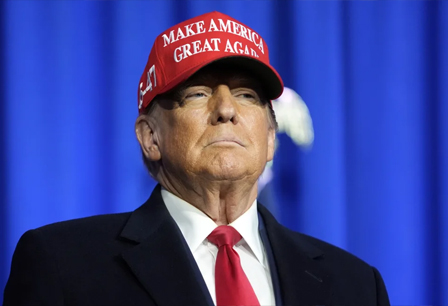Republican presidential nominee Donald Trump would not fire Federal Reserve Chair Jerome Powell if the former president wins the election in November, according to a Bloomberg interview published Tuesday.
But Trump’s statement wasn’t exactly a promise, saying he’d let Powell finish up his second term, “especially if I thought he was doing the right thing.”
Of course, his statement also assumes it would be technically possible for a sitting president to oust any Fed official.
Powell, a registered Republican, was first tapped to helm the central bank by Trump in 2017. Trump sang Powell’s praises at the time, saying “he’s strong, he’s committed, he’s smart.” Trump doesn’t have that same rosy view of his central bank appointee any more and has repeatedly attacked the current Fed chief, even accusing him earlier this year of planning to cut interest rates just to help Democratic politicians win elections (though there isn’t any evidence of that).
The former president has made it clear he will not reappoint Powell if he clinches the White House in November. Trump’s ire toward Powell goes as far back as 2018 when the Fed raised rates, which sparked chatter even then as to whether or not Trump could even fire Powell.
However, if Trump changes his mind outright because he thinks Powell isn’t doing “the right thing” and does try to remove him, it could kick off a messy uphill battle. The law states that a sitting president can dismiss any Fed official, but only for “cause,” not because of policy differences. That still wouldn’t stop Trump from pushing to oust Powell before the Fed head’s term concludes in 2026.
Powell’s willingness to fight back through the courts would also be key in determining whether or not a president does have the power to fire the Fed chair, which would eventually reach the nation’s highest court.
“One of the few Supreme Court precedents on the president’s authority to fire a member of a body created by Congress came from William Humphrey, an aggrieved conservative commissioner on the Federal Trade Commission, who was fired by Franklin Roosevelt in 1933 over policy differences,” the Brookings Institution wrote in a 2018 analysis.
“He sued for reinstatement and even though he died while the litigation was pending, the Supreme Court still took up his case. (This is why the case is called Humphrey’s Executor: His estate carried on after Mr. Humphrey’s demise.) The estate won. The Supreme Court would have to decide whether the same logic applies to the chair of the Fed’s Board of Governors.”
The Fed is an independent government institution, guided by its two mandates of price stability and maximum employment. It answers to Congress, not the US president, according to the law that established the central bank. The only influence the president has over the Fed is the ability to appoint the seven officials who serve on the central bank’s board of governors, including the chair, which is still subject to approval by the US Senate.












